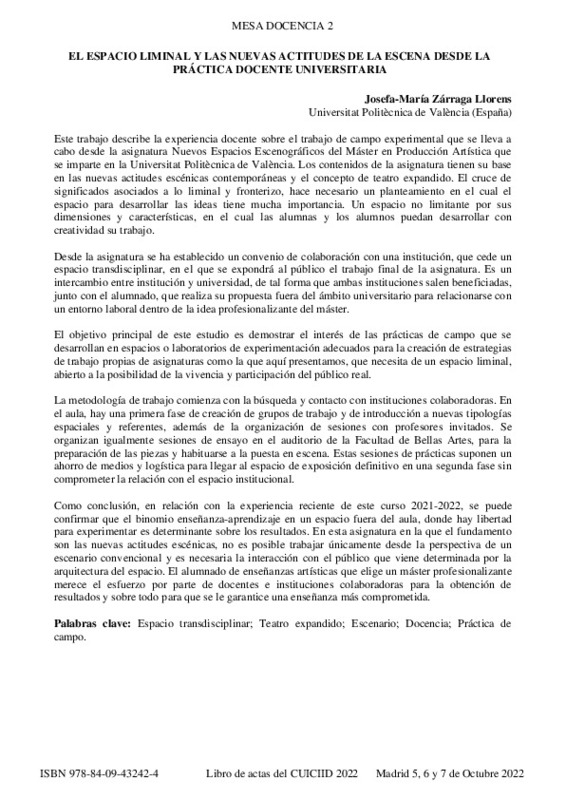|
Resumen:
|
[EN] This paper describes the teaching experience of the experimental fieldwork in the subject New Scenographic Spaces of the Master's Degree in Artistic Production taught at the Universitat Politècnica de València. The ...[+]
[EN] This paper describes the teaching experience of the experimental fieldwork in the subject New Scenographic Spaces of the Master's Degree in Artistic Production taught at the Universitat Politècnica de València. The course contents are based on the new current stage attitudes and the concept of expanded theatre. The crossing of meanings associated with the liminal and borderline makes necessary an approach in which the space to develop ideas is critical. An area that is not limited by its dimensions and characteristics, in which students can build their work creatively.
The course has established a collaboration agreement with an institution that provides a multidisciplinary space in which the final work of the course will be exhibited to the public. It is an exchange between institution and university. Both institutions benefit, together with the students, who carry out their proposal outside the university environment to relate to a working environment within the professionalising idea of the master's degree.
The main objective of this study is to demonstrate the interest in-field practices that are developed in spaces or experimental laboratories suitable for the creation of work strategies specific to subjects such as the one presented here, which requires a liminal space open to the possibility of the experience and participation of the actual public.
The working methodology begins with the search for and contact with collaborating institutions. The first phase of creating working groups in the classroom, introducing new spatial typologies and references and the organisation of sessions with guest lecturers. Rehearsal sessions are also organised in the Faculty of Fine Arts auditorium to prepare the pieces and get used to staging them. These practice sessions save resources and logistics to reach the ideal exhibition space in a second phase without compromising the relationship with the institutional space.
In conclusion, about the recent experience of this academic year 21-22, it can be confirmed that the teaching-learning binomial in a space outside the classroom, where there is the freedom to experiment, is a determining factor in the results. In this subject, in which the basis is the new stage attitudes, it is not possible to work solely from the perspective of a conventional stage, and interaction with the audience is necessary, which is determined by the architecture of the space. Artistic education students who choose a professionalising master's degree deserve the effort of teachers and collaborating institutions to obtain results and, above all, to guarantee a more committed education.
[-]
[ES] Este trabajo describe la experiencia docente sobre el trabajo de campo experimental que se lleva a
cabo desde la asignatura Nuevos Espacios Escenográficos del Máster en Producción Artística que
se imparte en la ...[+]
[ES] Este trabajo describe la experiencia docente sobre el trabajo de campo experimental que se lleva a
cabo desde la asignatura Nuevos Espacios Escenográficos del Máster en Producción Artística que
se imparte en la Universitat Politècnica de València. Los contenidos de la asignatura tienen su base
en las nuevas actitudes escénicas contemporáneas y el concepto de teatro expandido. El cruce de
significados asociados a lo liminal y fronterizo, hace necesario un planteamiento en el cual el
espacio para desarrollar las ideas tiene mucha importancia. Un espacio no limitante por sus
dimensiones y características, en el cual las alumnas y los alumnos puedan desarrollar con
creatividad su trabajo.
[-]
|







